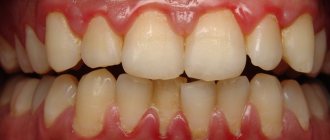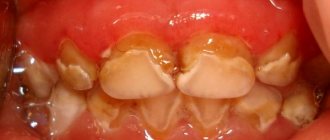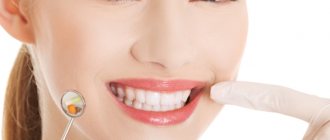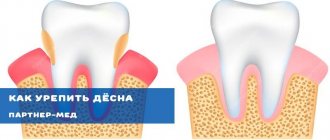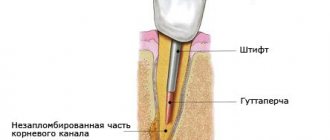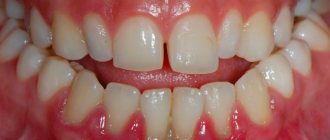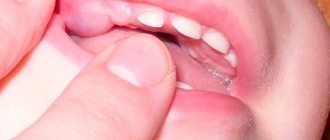Author: Brodsky Sergey Evgenievich Deputy Chief Physician, Candidate of Medical Sciences in the specialties: dentistry and medical microbiology People often notice traces of blood on a toothbrush, but do not understand why their gums bleed when brushing, are in no hurry to visit the dentist and prefer to seek advice from friends . This approach to the problem is incorrect, because any self-medication without knowledge of the cause that provoked the pathological phenomenon can lead to irreparable consequences. People who are far from medicine cannot know their body’s reaction to the medicinal components of the proposed drug, especially if they have a history of chronic diseases.
Deputy Chief physician Sergey Evgenievich Brodsky
Sign up for a free consultation
+7
Causes of bleeding from gums
If traces of blood begin to appear on your toothbrush or in the sink, you should visit the dental office. In many cases, this phenomenon indicates a serious health problem. The true causes of gum bleeding during brushing can only be determined by a qualified dentist. There are several prerequisites that can provoke the appearance of blood from the gums when performing a morning hygiene procedure.
Tartar formation between teeth
The reason for the appearance of blood while brushing your teeth may also be due to insufficient oral hygiene, which leads to the formation of tartar. In this case, the mechanical action of the brush puts pressure on the hard limescale, and it injures the delicate gum tissue, causing blood to appear between the teeth when brushing. In this case, professional hygienic cleaning of teeth and plaque and tartar in dentistry is recommended, the procedure is carried out every six months. Photo: Bleeding when brushing teeth, plaque and tartar formation on teeth
Development of periodontitis or periodontal disease
These serious dental diseases, in which the gums bleed heavily, if not properly treated, can lead not only to tooth loss, but also to the development of dangerous internal pathologies. The consequences of periodontal infections are gastritis, cirrhosis, and stomach ulcers. The appearance of the following signs allows one to suspect periodontal disease and periodontitis:
- discomfort when chewing solid food;
- bleeding gums when brushing teeth;
- burning in the gum area.
- gnathological diseases and muscle hypertonicity
If such symptoms appear, you should urgently visit the dentist. Identifying these diseases at an early stage and carrying out appropriate treatment allows you to completely get rid of the ailments. Photo: Periodontal disease and periodontitis provoke bleeding when brushing your teeth in the morning
Bleeding gums and other symptoms
Bleeding should already be considered the main symptom of gum disease, but this phenomenon is also often accompanied by such manifestations as:
- bright red gums and swelling
- pain when eating and when touched
- specific smell and altered taste
- plaque at the edge of the gums
- high concentration of saliva
Any of these symptoms are a good reason to visit your doctor's office. You should also remember: bleeding gums often develop against the background of poor oral hygiene and reduced immunity. Read more about this in a separate article.
Rules for rehabilitation after surgery
Gum curettage at the Smile-at-Once clinic is performed by professional surgeons. This is not a complicated operation, complications after which are extremely rare. However, patients must strictly follow all the recommendations of their attending physician so that rehabilitation will be quick and comfortable.
After the procedure of closed curettage of the gums, it is necessary to refrain from eating for several hours, not to brush your teeth for 24 hours (limit rinsing) and to exclude coloring foods from the diet. If tooth sensitivity increases, it is recommended to use special pastes. It is also necessary to rinse the mouth to strengthen the gums and relieve inflammation.
The “open curettage” operation requires a longer rehabilitation: it is also necessary to refrain from eating in the first few hours, give preference to warm and soft dishes for 1-2 days, and minimize activity. After the operation, the patient is prescribed rinses, as well as antibacterial and anti-inflammatory drugs, which will speed up the process of tissue repair.
Disadvantages of the operation
Curettage is a surgical operation performed under local anesthesia. It is not complicated, but it requires preparation and subsequent rehabilitation, which takes several days. Therefore, the only drawback of the technique can be considered the need for anesthesia and surgical intervention.
Why do my gums bleed when brushing my teeth?
Hormonal background
Hormonal changes (mostly affecting pregnant women and teenagers) are one of the many causes of bleeding gums. Dentists note: hormonal changes in the body are accompanied by changes in the chemical composition of saliva, which leads to rapid mineralization of plaque on the teeth.
Lack of vitamins
A deficiency of vitamins C or K also causes blood to appear on the gums. An insufficient amount of vitamin C (especially during seasonal vitamin deficiency, a decrease in general immunity) leads to rapid wear of blood vessels and bleeding gums, and the lack of vitamin K, responsible for blood clotting, depletes the gums and makes them extremely sensitive and loose.
Microflora
Bacteria inhabiting the oral cavity are responsible for the accumulation of dental plaque, which can, over time, with poor hygiene, become tartar, causing inflammation and bleeding.
Changes in the composition of saliva in the body against the background of periodontitis and gingivitis directly affect both the respiratory tract and the normal functioning of the gastrointestinal tract.
How to deal with inflammation?
To prevent or eliminate gum inflammation after professional tartar cleaning, it is important to follow your dentist's recommendations.
- After professional oral hygiene, do not consume hot and cold foods and drinks for 2-3 hours, coffee and juices for about 12 hours.
- Avoid roughage and solid foods for a day.
- Buy a new toothbrush with soft bristles to prevent injury to the gum tissue.
- Take biocomplexes with a balanced composition, which includes vitamins A, PP, D, as well as phosphorus and calcium.
To prevent complications and re-formation of dental plaque, regularly perform professional oral hygiene and visit your dentist every 6 months.
Causes of gum bleeding when brushing teeth
Why do my gums bleed when brushing my teeth? The causes of bleeding gums can be different, and one of them is mechanical damage. The simplest thing is inept or hasty handling of a toothbrush. The situation can be the most everyday: you are late for work, you decide to reduce the usual time for brushing your teeth, you start aggressively pressing the brush on your teeth - and here is the result: the gum tissue is damaged and bleeding. It's unpleasant, but not fatal. Another reason from the same series is an incorrectly chosen toothbrush: your teeth and gums are sensitive, periodically react sharply to hot or cold, and instead of a brush with soft or medium bristles, you chose one with hard ones. The result: severe bleeding, pain, inflammation and even slight detachment of the gum from the tooth. Therefore, it is important to choose the right brush.
Treatment of illness using folk remedies
In addition to the main treatment, you can use traditional methods at home. It is worth considering that natural ingredients can provoke allergic reactions, so it is important to be careful when using them. Treatment is permissible only with the permission of a specialist. Night compresses applied to the inflamed area are highly effective. They can be soaked in an infusion of oak bark, a decoction of sage or chamomile. The course of treatment is 7-10 days.
The easiest way is to rinse and brush your teeth with salt water. To prepare it, take a teaspoon of salt and dissolve it in 200 ml of water. It helps strengthen the gums and eliminate the inflammatory process. It is recommended to take table sea salt, as it contains a sufficient amount of iodine. Additionally, using sea buckthorn oil or rosehip oil, you can massage the gums with your fingers. The duration of therapy is 10-14 days.
An infusion of St. John's wort gives good results. To prepare it, take 15 g of the ingredient in dry form, pour in 150 g of vodka or alcohol and leave to infuse for 5-7 days in a dry, dark place. Rinse your mouth with the resulting infusion and lubricate your gums (2-3 times a day). Decoctions and tinctures of medicinal herbs (chamomile, sand sedge, mountain arnica) can be used not only as rinses, but also in the form of applications (using cotton swabs).
What to do if your gums constantly bleed?
The chronic nature of bleeding gums is an alarm bell for any person. How to treat and what to do in such a situation? Some important tips for preventing and treating bleeding gums.
- Choose the right toothbrush, floss and toothpaste. The toothbrush and floss should not be hard, and the toothpaste should not contain abrasive particles.
- Switch to balanced foods. Lack of vitamins (for example, group B, as well as C, K, B, A and E) and minerals (for example, zinc, calcium) destroys teeth and depletes gums. Eat more solid vegetables, meat, dairy products, citrus fruits and nuts.
- Visit your dentist. Timely professional teeth cleaning by a specialist will help prevent the development of gum diseases such as gingivitis and periodontitis.
- Avoid mouthwashes that contain alcohol. Although alcohol-containing rinses kill most bacteria, they dry out the gums excessively, which only aggravates the course of oral diseases due to bleeding gums.
- Give up bad habits. Smoking and alcohol irritate the mucous membrane in the mouth and worsen gum disease.
Prevention
Most often, bleeding gums can be avoided by following fairly simple to follow recommendations, which you can find below:
- Use a soft toothbrush, do not injure your gums while brushing.
- Get rid of bad habits, reduce your coffee consumption.
- Balanced diet and vitamin intake. Eat raw vegetables and fruits, they help get rid of plaque and are rich in vitamins.
- Regular oral hygiene. Use dental floss and mouthwash after every meal. Brush your teeth 2 times a day. Get examined by a dentist at least 2 times a year, unless there are any pathologies.
- Select your toothpaste together with your dentist. There are a large number of pastes with a therapeutic, healing effect. And do not use one paste for more than 4 months.
Bleeding when brushing teeth in pregnant women
Reduced immunity
Bleeding gums in expectant mothers often occur when hormonal levels change. This leads to an inevitable decline in immunity (both general and local - in the oral cavity) and an imbalance in the acid-base balance, which provokes the growth of bacteria and accelerates the accumulation of plaque. All together causes inflammation, pain when brushing teeth and bleeding.
Poor hygiene
During pregnancy, gums bleed when brushing your teeth, also due to poor oral hygiene, or even lack thereof, as a result of which harmful bacteria multiply on the gums, contributing to the formation of plaque on the teeth. Hence inflammation, redness, pain - and, as a result, gingivitis, which over time can develop into a much more serious form - periodontitis.
Lack of calcium
Pregnancy is a huge burden on the female body. Calcium deficiency in an organism experiencing severe stress leads to the development of gingivitis, therefore, in the treatment of bleeding gums during pregnancy, an integrated approach is important: proper nutrition, vitamins and healthy sleep.
Important!
Choose the right brush and don’t forget that you need to change it every 3 months. Remember: a toothbrush is a purely individual thing, no one but you should use it. Also rinse the brush thoroughly after each use.
How to quickly stop bleeding?
If you are surprised by the bleeding while brushing your teeth, and you can only see a doctor in a couple of days, it is important to quickly stop the bleeding. You can do this in several ways:
- Apply a cotton swab
soaked in hydrogen peroxide to the gums. Such manipulations will help quickly stop the bleeding and eliminate possible infections. - Use special anti-bleeding agents
. For example, Asepta Adhesive gum balm easily eliminates pathogenic microflora of the oral cavity, relieves inflammation and bleeding of the mucous membrane. The presence of an adhesive base allows the drug to remain on the gums for a long time. This ensures a prolonged and more effective action of antimicrobial components. The standard course of treatment with balm is 7-10 days.
Surgery
If the gums are severely inflamed and there are deep periodontal pockets, standard professional cleaning may not be effective. To combat inflammation in such cases, surgical treatment is indicated.
- Flap surgery - cutting off the affected areas of soft tissue, removing bacterial deposits under the gum, applying sutures.
- Open curettage is effective for periodontitis and is aimed at deep cleansing of periodontal pockets from granulations and tartar.
The doctor will determine the appropriate treatment tactics after examining the patient.
How is gingivitis related to bleeding gums?
If blood appears on your toothbrush, this may be a harbinger of gingivitis. This is a superficial soft tissue disease. Bacteria accumulate under the gums, which provoke an inflammatory process. The gums become swollen, red and begin to bleed at the slightest pressure on them. If you consult a doctor at this stage, quick treatment is possible. The dentist carries out professional cleaning of the oral cavity, removing the source of inflammation, treats it with an antiseptic and prescribes antibacterial agents.
If a person ignores the doctor’s recommendations, gingivitis develops into serious diseases: periodontitis and periodontal disease. They are dangerous because a pocket forms between the gum and tooth. Gradually it fills with pus, the teeth begin to loosen. Severe inflammation due to an abscess can lead to tooth extraction. But if therapy is not carried out in time, pus can affect healthy soft tissues and periosteum, which subsequently leads to their atrophy.
